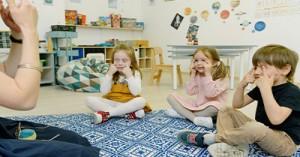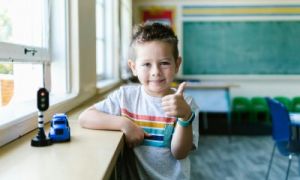When writing a report on a child, it's an opportunity for the Educator to capture the child's learning and for parents to receive an account of their child's engagements within an early childhood setting. The following article provides information on examples of writing prompts and comments that can be used when writing yearly reports on the child.
For educators writing the report, the comments need to be descriptive. It must be based on observation of the child in different environments and engaging in different activities. Comments should not be comparative, judgemental or conclusive.
Writing Prompts and Comments
The following are examples of writing prompts, and comments that can be used when writing yearly reports on the child:
Child's Personality
- Zee comes cheerfully to school and greets her teachers with a bright smile. She leaves her things in class and runs off to catch a little game with her friends outdoors before the bell goes.
- Tina has learnt to express her needs and difficulties clearly and appropriately. When someone is assertive in a group and she disagrees, she is able to stand up to them with an emphatic ‘no’.
- He does not give in easily to the demands of his peers. He confidently stands up and asks for his rights.
- Her interest wanes when an activity has to be done in a group and she tends to get playful. She prefers to complete a project by herself.
- He tries to talk himself out of a tricky situation with his teacher but his own sense of fairness and reasoning stops this process midway.
Interactions
- Her social circle has widened. She has begun playing with the boys in her class. She shares a warm relationship with adults in the class. She always communicates her difficulties with her teacher.
- He seems interested in people, feels connected and has an affection for them. He is concerned when any of his classmates is in pain or is injured and will help them.
- He is very observant of his classmates and can report coherently what most of his friends are doing at any given point in time.
Cognitive Development
- Learning by watching others is a strategy Lee adopts successfully.
- He explores actively his natural environment and observes phenomena he comes across with a keen eye.
- He makes good connections and infers well.
- She is quick to follow concepts and directions. She listens carefully to instructions and responds accordingly.
- She is confident of whatever she undertakes and works independently.
- She completes a given task and does not hesitate to ask for help whenever required.
- Her interest in books continues as she spends a lot of time browsing through the books in the library corner.
- She is quick to notice the change of books and immediately settles down to browse through them.
- His quality of listening is selective. He will listen only to what interests him.
- He has to be reminded very often that he is in a group and needs to restrain himself.
- Sometimes this lack of listening is because he thinks he knows it already.
Communication and Language
- During circle time, she occasionally participates by sharing news.
- She has not been regular in bringing things for Show and Tell’. Participating in the programme may help her gain confidence in the presentation.
- Tarika is articulate. She has started participating in class discussions. She shares the news with much enthusiasm.
- She enjoys the ‘guest’ assemblies and asks pertinent questions to the speaker.
- He is an articulate child who speaks fluently in English. His speech is clear and coherent.
- He expresses his thoughts and ideas clearly. He is regular in bringing items for ‘Show and Tell’. He speaks confidently to the group. He also listens to his friends while they are speaking.
- Long conversations bore him as also listening to ‘Show and Tell’.
Physical Development
- Active and energetic, John enjoys being outdoors. He is agile on the jungle gym and runs very fast.
- He participates well in organised games. His motor coordination is good.
- Lucy takes long to finish her lunch. She seems to have strong reservations about some vegetables and food
- She is being helped to have all that is served without indulging in strong likes and dislikes.
Creativity
- Her creativity is expressed in her artwork. Her work is meticulously done. She is innovative in her craft work.
- Chris is learning to take care of his belongings. Very often he misplaces his books and stationery.
- He is also yet to take responsibility for the classroom chores. He does not volunteer to do the classroom duties but when called upon by the teacher or friends, does a neat job.
End Of The Year
- I have truly enjoyed getting to know Rose and wish her the very best in Kindergarten and beyond.
- I have enjoyed having Tim in my room this year and will truly miss him as he moves on to Kindergarten.
- Maya is a very special child and one that I will never forget. I will miss her next year.
- Toby is a wonderful student, and I’m happy to have had him this year.
- With her friendly, cooperative attitude, she will always be a pleasant addition to Kindergarten.
- Thank you for your cooperation and assistance at home with James.
- I enjoyed having Corey in my room.
Words and Phrases
Here are words and phrases that can be used and incorporated into reports:
Stressing The Positive
- Words: thorough, caring, cooperative, growth, superior, quality, striving, seeking, attempting, admirable, consistent, persevering
- Phrases: is able to, is strong in, has a good grasp of, independent learner, works hard, improved tremendously, is willing to take more risks, excels at, making good progress, does a great job with, has great potential for
Appreciating a Child's Unique Qualities
- Words: energetic, creative, hard worker, risk taker, imaginative, persistent, diplomatic, innovative, cooperative, original, leader, eager, thoughtful, enthusiastic, perceptive, welcomes, problem solver
- Phrases: interested in, positive attitude, interacts well with peers, thinks clearly, understands complex tasks, shows compassion, sets a standard for others, selects carefully, concentrates well, follows directions carefully, suggests new approaches, generates many original ideas, fluent reader, intrigued by, special talent for, skilled in, follows projects through to the end
Child Needs Extra Help
- Words: requires, struggles, seldom, usually
- Phrases: could profit by, shows a need for, finds it difficult at times to, it is helpful to, is challenged by, works best when, needs help with, I'm working with him/her to, had trouble with, making progress, seems reticent about, needs encouragement in, has a tendency to, let's find a way to solve this together
Words to be Wary of: Unable, can't, won't, always, never
When completing the end of year reports remember the main focus is to inform parents about their child's progress. It's important when writing reports they remain positive and can be used to encourage the child. It's a good learning opportunity as an Educator to take this time to reflect on the child's learning and to develop a meaningful understanding of each individual child.
References:
Shivram, Bina "Reporting On The Kindergarten Child", Journal of Krishnamurti Schools, Issue 8
"Favourite Words and Phrases For Reports", Scholastic, Teachers Magazine
"Report Card Comments", Lake Shore Learning







 Here is the list of the EYLF Learning Outcomes that you can use as a guide or reference for your documentation and planning. The EYLF
Here is the list of the EYLF Learning Outcomes that you can use as a guide or reference for your documentation and planning. The EYLF The EYLF is a guide which consists of Principles, Practices and 5 main Learning Outcomes along with each of their sub outcomes, based on identity,
The EYLF is a guide which consists of Principles, Practices and 5 main Learning Outcomes along with each of their sub outcomes, based on identity, This is a guide on How to Write a Learning Story. It provides information on What Is A Learning Story, Writing A Learning Story, Sample
This is a guide on How to Write a Learning Story. It provides information on What Is A Learning Story, Writing A Learning Story, Sample One of the most important types of documentation methods that educators needs to be familiar with are “observations”. Observations are crucial for all early childhood
One of the most important types of documentation methods that educators needs to be familiar with are “observations”. Observations are crucial for all early childhood To support children achieve learning outcomes from the EYLF Framework, the following list gives educators examples of how to promote children's learning in each individual
To support children achieve learning outcomes from the EYLF Framework, the following list gives educators examples of how to promote children's learning in each individual Reflective practice is learning from everyday situations and issues and concerns that arise which form part of our daily routine while working in an early
Reflective practice is learning from everyday situations and issues and concerns that arise which form part of our daily routine while working in an early Within Australia, Programming and Planning is reflected and supported by the Early Years Learning Framework. Educators within early childhood settings, use the EYLF to guide
Within Australia, Programming and Planning is reflected and supported by the Early Years Learning Framework. Educators within early childhood settings, use the EYLF to guide When observing children, it's important that we use a range of different observation methods from running records, learning stories to photographs and work samples. Using
When observing children, it's important that we use a range of different observation methods from running records, learning stories to photographs and work samples. Using This is a guide for educators on what to observe under each sub learning outcome from the EYLF Framework, when a child is engaged in
This is a guide for educators on what to observe under each sub learning outcome from the EYLF Framework, when a child is engaged in The Early Years Learning Framework describes the curriculum as “all the interactions, experiences, activities, routines and events, planned and unplanned, that occur in an environment
The Early Years Learning Framework describes the curriculum as “all the interactions, experiences, activities, routines and events, planned and unplanned, that occur in an environment


